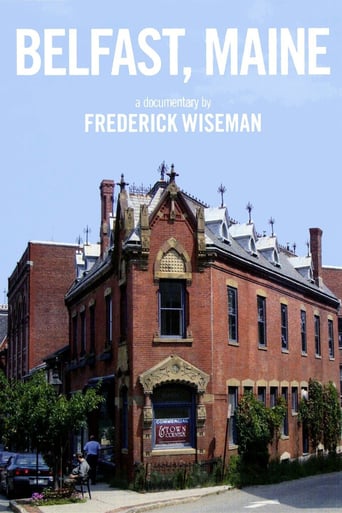

Very very predictable, including the post credit scene !!!
... View MoreVery very predictable, including the post credit scene !!!
... View MoreThis is one of the few movies I've ever seen where the whole audience broke into spontaneous, loud applause a third of the way in.
... View MoreTrue to its essence, the characters remain on the same line and manage to entertain the viewer, each highlighting their own distinctive qualities or touches.
... View MoreThis response is a reply to "Boredom Incarnate", a few lines down.First of all, the documentary you're referring to - the one that would capture the truth about Belfast Maine - doesn't exist for a reason. That's because Wiseman would probably find that film mediocre at best. At least here he can explore (or more simply, observe) a range of human experience, most of which couldn't be captured with a more privileged, middle class demographic or subject. And make no mistake, his are WORKING class subjects. The film is largely about processes, big or small, be they industrial relations (with the many factory sequences) or simple human relations. It is hugely perceptive, and extremely captivating, but the problem is that it leaves too much up to the viewer in terms of interpretation. This leads people to review the film with expressions like "boredom incarnate" when they should be saying things like "as close to the truth about 'some' forms of human behavior as you're likely to get with a camera in the room."See it.
... View MoreWish I could have voted 7.5. Wanted to check the demographics on Belfast after watching this film. Have to agree with so many others the focus was predominantly down-scale. Would like to have seen the 'other half', so to speak. From this film, it would seem the town is down-trodden, mostly illiterate & suffering from 2-digit IQs. Compassion & intelligence were shown, but not frequently. I'm sure Belfast is much like any other town, with a fair mixture of all levels.I like to 'observe' people & gather much from interactions, what is said between or among them.It's a decent movie but left me wanting...to know more, to get a more even feel.
... View MoreBelfast, Maine is an extraordinarily well made documentary. You are riveted to the screen, drawn into the lives of individuals trying to get by working in factories, dry cleaners, bakeries. I sat watching, never leaving for the full four hours.Now for the bad news. As a resident of Belfast, I couldn't help but see that a huge segment of the population was being ignored. Where were the professionals? I remember one doctor portrayed, on call in the emergency room. Lawyers? Real estate agents? Where was my favorite latte shop? Where were the hundreds of magnificent homes in our historic district? No. The director shut us out. He wanted to show what my boss refers to as "Hidden Belfast," not the one most of us see every day. I wish he had told me up front. The film ignores what Belfast has become over the past decade, a renaissance town, a tourist destination, with a beautiful waterfront, comfortable bed and breakfasts, and wonderful downtown. A place that two years ago the Cohn Brothers and their families (of Fargo fame) chose as a vacation destination.Belfast, Maine (the documentary) all too clearly reminded me what a good director could do...by not showing certain footage (and other careful editing,) totally distort the truth.
... View MoreThe summing-up of the great documentarian Frederick Wiseman's life's work--a four-hour record of a mid-sized Maine town that features local ringers for the cast of Wiseman's other movies: high-school teacher, cops, ER receptionists, social workers, homebound elderly folks, ministers, babies, meat-handlers, the dying. An English-class lecture late in the film on the meaning of MOBY DICK opens up this oracular work, which combines a hard-nosed appraisal of the facts of everyday, small-town life with a Whitmanesque embrace that leaves you overwhelmed and grateful.Wiseman's films make even the masters of American narrative movies look like self-promoting, candy-flinging hucksters. The hallmark of a Wiseman scene is a whipsaw between unbearable heartbreak and Swiftian laughter. The piece de resistance here features an extremely large, slovenly-clad teacher who resembles a popular weatherman, reading from a book on meteorology to a roomful of profoundly retarded elderly men. The sincerity of the teacher's work, and the look of dutifulness and agonizing boredom on the face of the pupils, make you want to laugh, cry and scream all in the same instant. Building to a soaring epiphany in a Belfast church, this movie functions on so many cylinders--spiritual, political, metaphorical--it seems insane that Wiseman hasn't been embraced as a national treasure. See it where you can, even if it's late-night public TV: this is the most penetrating, insightful and boundlessly rich community mosaic since NASHVILLE.
... View More